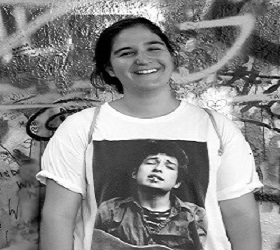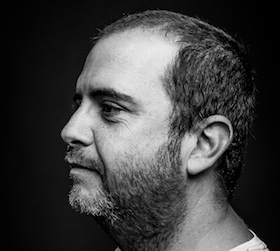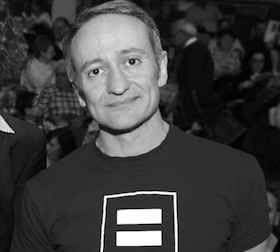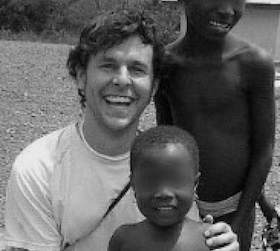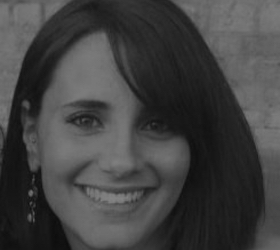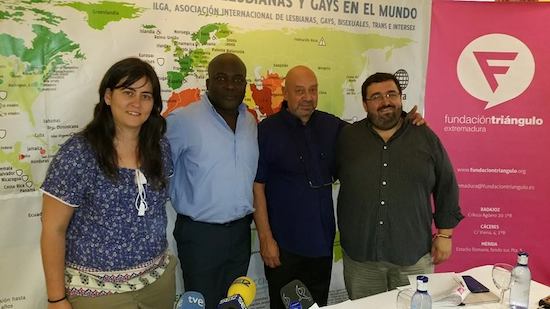
El miércoles 15 de julio será un día que Henry O. y Carlos Mateos nunca olvidarán. Henry O., natural de Nigeria, ha estado viviendo en Alcántara, una pequeña localidad de la provincia de Cáceres, durante los últimos ocho años; casi cuatro de ellos con su pareja Carlos Mateos. El miércoles Henry fue llevado a la comisaría de policía de Cáceres donde pasó una noche interminable y angustiosa en espera de ser deportado a su país, Nigeria, por su situación ilegal en España. Henry iba a ser deportado a su país de origen, donde, en algunas partes, la homosexualidad está castigada con la pena de muerte y en otras con penas de cárcel. Henry era muy consciente de que el destino que le esperaba en su país de origen no sería agradable. En Nigeria, la homosexualidad es inaceptable para la sociedad y las persecuciones políticas de los hombres abiertamente homosexuales se han llevado a cabo en numerosas ocasiones.
José María Núñez, Presidente de la Fundación Triángulo explicó la importancia de las circunstancias de Henry en la cadena de radio CadenaSER explicando los puntos que conforman esta terrible situación. Núñez explica, que Henry cuenta el apoyo de la ciudad de Alcántara y de sus ciudadanos y envíaron cartas, manifestaron su respaldo y defensa de Henry para que permaneciese en España. El equipo de la Fundación Triángulo en Extremadura pidió a Concepción Dancausa, la Delegada del Gobierno de España en Madrid para se “solicitase al Ministro del Interior de España para detener la deportación basado en 'razones sobrevenidas' también se contó con el apoyo y la asistencia del Presidente de la Junta, Guillermo Fernández Vara " según reflejó Jesús Conde en el ElDiario.es.
Henry ha sido autorizado a residir temporalmente en España ya que su deportación se ha paralizado por seis meses a través de los esfuerzos incansables y inflexibles de José María Núñez, y el cambio de actitud en el partido en el gobierno de España. Ahora la batalla de asilo permanente comienza; José María mencionó dos vías para lograrlo. El primero sería a través del reconocimiento de 'decisión política' que podría llevarse a cabo en España, ya que permite la posibilidad de que los inmigrantes para exigir su situación ilegal a legal, basado en las relaciones de la homofobia”, explicó José María Núñez en CadenaSER. Otra opción que Henry podía utilizar sería la del matrimonio entre Enrique y su compañero Carlos. Sin embargo, aquí es donde Henry se encuentra con el problema de su situación administrativa irregular. Henry no puede casarse con Carlos debido a que carece de un documento legalizado indicando su estado civil, uno que debe sellado en persona en su país natal de Nigeria (según el consulado español en Nigeria). Si Henry acudiese a Nigeria para recoger ese papel, más tarde se le negaría el reingreso en España debido a su situación ilegal actual. Además del riesgo enorme que correría de acudir allí.
Todo eso a pesar de que "Henry y su pareja han estado viviendo juntos en la residencia compartida durante los últimos 3 años en Alcántara donde tiene su 'otra familia' y su 'otro mundo', donde le llaman por su nombre y lo tratan muy bien. Henry también ha colaborado con la oficina de turismo local, ofreciéndose como traductor cuando los visitantes hablan inglés. Carlos, pareja de Henry O. ha demostrado en su nombre que ambos están muy bien integrados en la sociedad y se limitan a querer vivir una vida tranquila juntos ", explica EuropaPress en el periódico en línea, 20 minutos.
Jose Máría Núñez y la Fundación Triángulo en Extremadura, José María Núñez y Madrid están trabajando sin descanso para resolver la irregularidad en el papeleo de Henry y lograr el asilo indefinido para él en España. Sólo la residencia permanente y legal de Henry en España es lo que garantizaría su protección contra la persecución y quedar libre del temor a perder la vida, por ser meramente quién es. José María explica que "el castigo al que Henry O. realmente está siendo sometido es el hecho de que él no puede regresar a su propio país. Lo que es realmente un problema grave en la raíz de todo esto es el hecho de que 78 países de el mundo todavía clasifican la homosexualidad como ilegal y 8 de ellos se aplica la pena de muerte. [Como Él continúa diciendo:] Por encima de todo la legislación en España es inhumana, "no se pueden permitir las deportaciones de personas que estan iniciando una vida aquí en España'", concluye EuropaPress en el periódico en línea, 20 minutos.
Incontables cambios se deben hacer en el mundo para evitar que las personas que no lo merecen sufran violaciónes horribles de sus derechos humanos todas las personas son iguales y merecedores de los mismos derechos ya que cada uno de nosotros no somos más que seres humanos.
Fuentes:
- Jesus Conde, “Suspenden a última hora la deportación de un nigeriano gay que vive en Cáceres” in http://www.eldiario.es/eldiarioex/sociedad/Orden-expulsion-nigeriano-vigente-homosexuales_0_409459957.html
- CadenaSER: http://play.cadenaser.com/audio/000WB0908420150716164907/jose-maria-nunez-portavoz-de-fundacion-triangulo-creemos-que-buena-direccion/
- EuropaPress, “Un gay nigeriano pide ayuda al consulado en su país para evitar ser deportado y juzgado por su condición sexual” in http://www.20minutos.es/noticia/2516639/0/nigeriano-gay-pide-ayuda-al-consulado-espanol-su-pais-para-evitar-ser-deportado-juzgado-por-su-condicion-sexual/
Peaceful fight for Henry O.’s right to live in peace.
Wednesday July 15th will be a day that Henry O. and Carlos Mateos will never forget. Henry O., a Nigerian native, has been living in the province of Cáceres in Alcántara for the past eight years; nearly four of them which he has shared with his partner Carlos Mateos. On Wednesday Henry was taken to the police station in Caceres where he spent, what seemed as a never ending afternoon followed by nerve-wracking night awaiting to be deported back to his country of Nigeria for his illegal status in Spain. Henry was to be deported to his original country where, in certain parts, homosexuality is chastised with the death penalty and others where it is punished with jail time. Henry was well aware that the fate that awaited him in his home country would be not virtuous nor pleasing. In Nigeria, homosexuality is unaccepted by society and political persecutions of openly gay men have been carried out on numerous bases.
José María Núñez, the President of the Triangle Foundation relayed the importance of Henry’s circumstances on the radio station CadenaSER explaining the fine points that make up this dreadful situation. Even though Henry has been living in Spain illegally, he received a job offer, which nowadays is call for celebration, but in his situation is what set the ball rolling towards what could have been his death sentence. Senor Nunez explains, with the support of the city of Alcántara, its citizens sending letters, manifesting their spirits of backing and defense for Henry to remain in Spain, along with, the Triangle Foundation’s team in Extremadura beside Concepción Dancausa, the Delegate from the government of Madrid that together, “asked the Minister of Interior Affairs of Spain to stop the deportation based on ‘supervening reasons’ alongside the support and assistance of the President of the board Guillermo Fernández Vara and the regional delegate, Cristina Herrera,” according to Jesus Conde in the online newspaper ElDiario.es of Extremadura.
With the greatest of gratitude, Henry is able to reside in Spain since his deportation has been temporarily paralyzed through the relentless and unyielding efforts of José María Núñez, and the change of heart in the governing party of Spain. Now the battle of permanent asylum begins; José María mentioned two routes to achieve it. The first would be through the recognition of ‘political choice’ which could be carried out in Spain as it permits the possibility for immigrants to exact their illegal status to legal, based on dealings of homophobia”, explained Jose Maria Nunez in CadenaSER. Another option that Henry could peruse would be that of marriage between Henry and his partner Carlos. However, this is where Henry finds the extension of how deep his problems of irregularity goes. Henry is unable to marry Carlos due to the deficiency of a legalized document stating his civil status, one which must be processed in person in his native country of Nigeria. If Henry were to go to and solicit this necessary paper, he would later be denied reentry into Spain due to his current illegal status.
Even though, “Henry and his partner have been living together in the their shared residence for the past 3 years in Alcántara where he has his ‘other family’ and his ‘other world’ where they call him by name and treat him very well. Henry has also collaborated with the local tourist office, offering himself as a translator when English visitors come. Carlos, Henry O.’s partner has demonstrated on his behalf that the both of them are very well integrated in society and merely want to live a tranquil life together,” explains EuropaPress in the online newspaper, 20MINUTES.
Jose Maria Nunez and the Triangle Foundation in Extremadura and Madrid are working unremittingly to resolve the irregularity in Henry’s paperwork and continue on with the journey to indefinite asylum and regularity for him in Spain. Henry’s permanent and legal stay in Spain is what will ensure his protection from persecution and free from the dread of losing his life, for being merely who he is. José María explains, “the penalty that Henry O. is really being subjected to, is the fact that he cannot return to his own country, that there is a serious problem at the root of it all, along with the fact that 78 countries in the world still classify homosexuality as illegal and 8 of them apply the death penalty. [As He continues to say,] Above all the legislation in Spain is inhumane, in the fact that ‘it cannot permit’ deportations of people ‘initiating a life here in Spain,’” concludes EuropaPress in the online newspaper, 20MINUTES.
Countless changes are to be made in the world to prevent individuals from undeserving and ghastly violations of their human rights for the world to come to grips with the fact that all individuals are equal and deserving of rights; exemplifying that each one of us are merely a human beings.
Sources:
- Jesus Conde, “Suspenden a última hora la deportación de un nigeriano gay que vive en Cáceres” in http://www.eldiario.es/eldiarioex/sociedad/Orden-expulsion-nigeriano-vigente-homosexuales_0_409459957.html
- CadenaSER: http://play.cadenaser.com/audio/000WB0908420150716164907/jose-maria-nunez-portavoz-de-fundacion-triangulo-creemos-que-buena-direccion/
- EuropaPress, “Un gay nigeriano pide ayuda al consulado en su país para evitar ser deportado y juzgado por su condición sexual” in http://www.20minutos.es/noticia/2516639/0/nigeriano-gay-pide-ayuda-al-consulado-espanol-su-pais-para-evitar-ser-deportado-juzgado-por-su-condicion-sexual/














